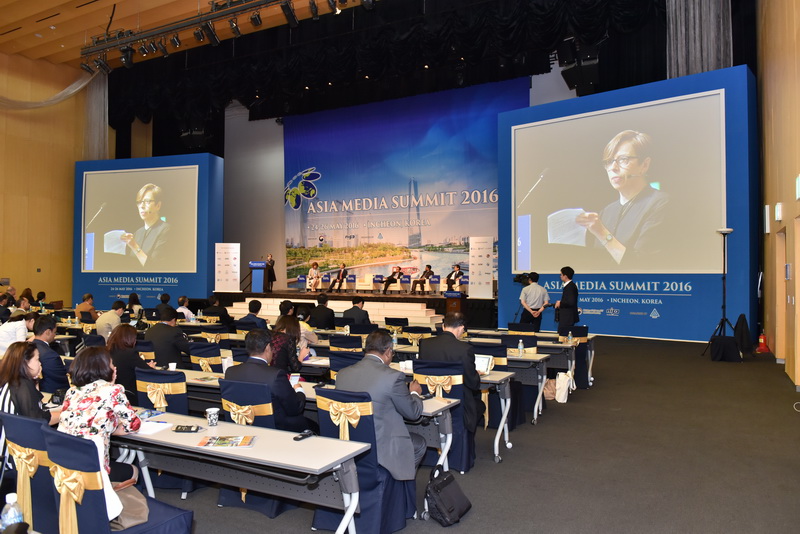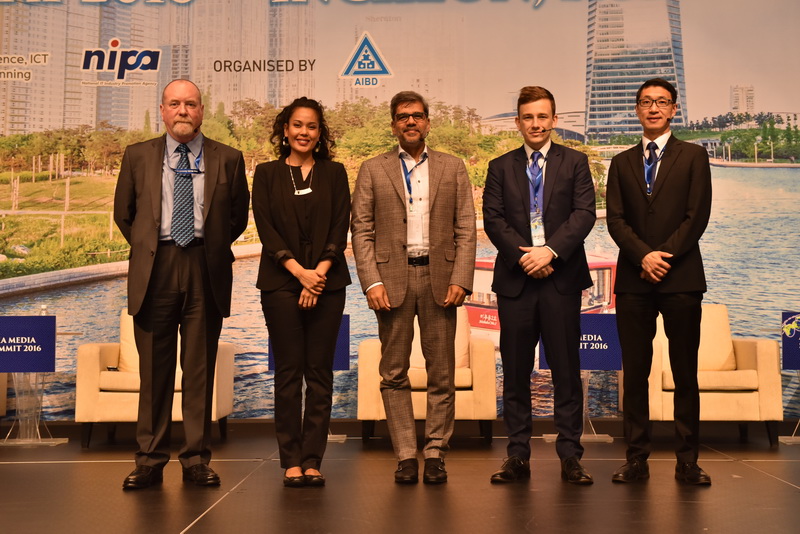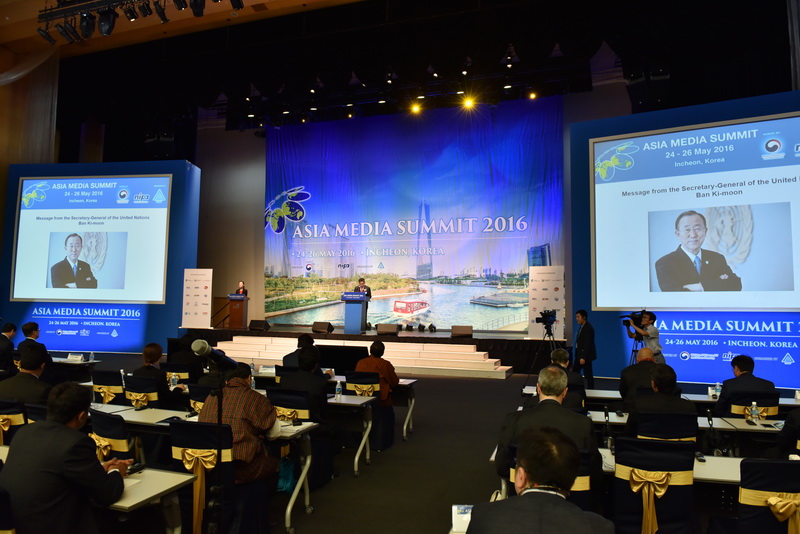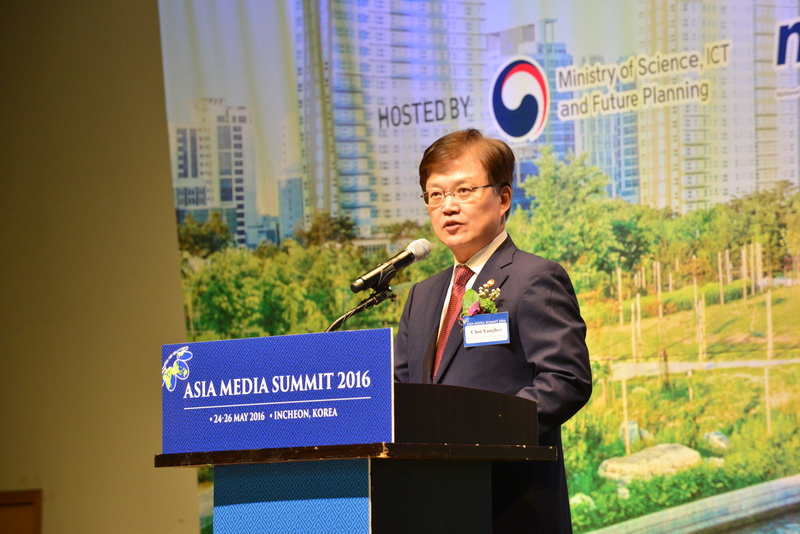Audiences will have many screens to watch news anytime and anywhere, and to draw their attention, particularly the young, broadcast journalists must have a story to tell, one that offers accuracy, analysis, and expertise, and must help audiences make sense of it.
This approach is how BBC World Service has operated in the world, says Ms Francesca Unsworth, Director, World Serive Group, BBC, United KIngdom, emphasising that “content remains queen or king.”
Audiences will have many screens to watch news anytime and anywhere, and to draw their attention, particularly the young, broadcast journalists must have a story to tell, one that offers accuracy, analysis, and expertise, and must help audiences make sense of it.
This approach is how BBC World Service has operated in the world, says Ms Francesca Unsworth, Director, World Serive Group, BBC, United KIngdom, emphasising that “content remains queen or king.”
She spoke at the CEO Roundtable of the Asia Media Summit on 26 May 2016 in Incheon, Korea.
Speaking on the topic “Looking Forward: Vision for Cutting-edge Content,” Ms Unsworth said BBC World Service experiments a lot to keep pace with new consumption habits.
To ensure BBC World Service increase its reputation as one of the most trusted international news providers in the world,“BBC World Service tells stories from a broad range of perspective, using their different languages service. We also tackle issues that local content can’t do the same way such as women rights, homosexuality and free speech in countries like North Korea, Honking and Saudi Arabia,” Ms Unsworth pointed out. In addition, BBC uses new technologies such as drones, 360 degree virtual reality, and live streaming.
She said news around the world is experiencing a digital, commercial, competitive and audience revolution. Broadcasters are developing new business models, confronted by dynamic competitors including digitally-based players and content aggregators like Google, Facebook and Apple, and changing consumption behaviour, especially of the young who are embracing new ways of engaging with news.
To deal with this revolution and serve more countries where freedom is under threat, BBC World Service will soon begin its biggest expansion since the 1940s.
“We will go over the heads of dictators and governments who are averse to open and accessible news and, thus, will make the provision of news more complex,” she said.
In order to sustain their relationships with audiences, which tend to be younger and more female, Ms Unsworth said they will take digital at the heart of what they do by making sure they keep in touch with audiences, talk directly to them and allow them to talk to each other.
Content is Still King
Audiences will have many screens to watch news anytime and anywhere, and to draw their attention, particularly the young, broadcast journalists must have a story to tell, one that offers accuracy, analysis, and expertise, and must help audiences make sense of it.
This approach is how BBC World Service has operated in the world, says Ms Francesca Unsworth, Director, World Serive Group, BBC, United KIngdom, emphasising that “content remains queen or king.”
‘Invasion of Globalised Content’
Asian media is raising concerns about the ‘invasion’ of globalised content on various screens that threatens local content and may necessitate government regulation such as imposing a content quota system to preserve local cultures in the region.
In Bhutan, Bollywood programmes and Korean dramas and variety shows have invaded local content, says Kinley Dorji, a journalist and Secretary, Ministry of Information of Bhutan during the Moderated Debate at the 13th Asia Media Summit in Incheon, Korea.
Monetising Content
Broadcasters were urged to preserve good content by digitising and managing it efficiently in order to share this valuable resource to future generations and enable companies to make some money.
“So much good content is stored in some offices and libraries of government agencies, private companies and broadcast organisations that unless this is digitised, it will simply vanish in three to five years,” Mr Sanajay Salil, Managing Director, MediaGuru, India, said in his presentation during the plenary session on “Monetising Content and Dealing with Copyright Issues” at the 13th Asia Media Summit on 26 May 2016 in Incheon, Korea.
Harmonious Integration between Traditional and New media
Information Minister Hasanul Haq Inu of Bangladesh said on Tuesday traditional broadcasting and social media need not clash instead they should work towards harmonious integration in providing information, education and entertainment to audiences.
Despite being more professional, traditional broadcasting should be open to fine-tuning their products and services to response to the changing media landscape and audience needs, the Minister said.UN Chief Urges Better Protection for Independent, Free Media
UN Secretary General Ban-Ki-Moon expressed Tuesday his concern about the “increasingly restrictive environment for media workers in many countries,” saying that constraints on freedom of expression are shackles on progress itself.
“I will continue to urge all governments, politicians, businessmen, and citizens to commit to nurturing and protecting an independent, free media,” Mr Bank-Ki-Moon said in his message to some 300 broadcasters from Asia-Pacific attending the 13th Asia Media Summit (AMS) in Incheon, South Korea.Asia Pacific to Lead Development of Global Broadcasting Content
Mr. Choi Yanghee, Korean Minister of Science, ICT and Future Planning (MSIP) said on Tuesday that the Asia-Pacific region, home to four billion people and the world’s dynamic economy will be able to leverage its long history and rich cultural heritage to lead the development of global broadcasting content.
“We must continuously produce innovative and new media content to create added value and bring more joy to audience,” Minister Choi said in his keynote address at the inaugural session of the 13th Asia Media Summit (AMS) held in Incheon, Korea.Exhilarating Excursion for all AMS 2016 Delegates
Delegates are in for an exciting time with the official
Exhilarating Excursion for all AMS 2016 Delegates
Delegates are in for an exciting time with the official
AMS 2016 – Speakers & Bio
.tftable {font-size:12px;color:#000000;width:100%;border-width: 1px;border-color: #729ea5;border-collapse: collapse;} .tftable th {font-size:12px;background-color:#acc8cc;border-width: 1px;padding: 8px;border-style: solid;border-color: #729ea5;text-align:left;} .tftable tr {background-color:#ffffff;} .tftable td {font-size:12px;border-width: 1px;padding: 8px;border-style: solid;border-color: #729ea5;text-align:center; vertical-align:middle;} .tftable tr:hover {background-color:#ffffff;}
Kind and Urgent Reminder AMS 2016
- AIBD is pleased to announce that the official venue of Asia Media Summit 2016 will be theSongdo Convensia (Convention) Center. The Convensia is located in Songdo IBD, Songdo International City, Incheon Free Economic Zone, Incheon.
- AMS 2016 Registration Deadline
The deadline for AMS 2016 registration is Friday, 15 April 2016 which is approaching fast. If you have not done this, please register online as soon as possible at the link here. We are asking for registration by the deadline for logistical purposes.
- AMS 2016 Hotels Registration Deadline
The official hotel for AMS 2016 delegates will be the Oakwood Premier Incheon Hotel, while the satellite hotel will be Orakai Songdo Park Hotel, both located at a close walking distance to the Songdo Convensia (Convention) Center.
Please note that self-funded bookings must be made directly with the respective hotel.
Discount rates for Oakwood Premier Incheon Hotelare available until midnight of Sunday, 17 April 2016 using the special promo code,which you will see after the online registration process is complete. From 18 April 2016 standard rates apply!!!
For full information on the room rates for both Oakwood Premier Incheon Hotel and Orakai Songdo Park Hotel, please register online at the link here.






